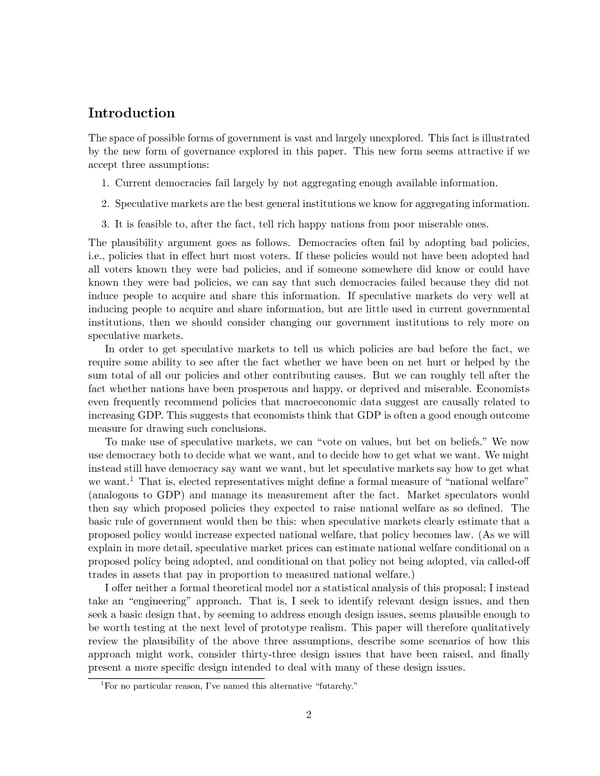Introduction Thespaceofpossibleformsofgovernmentisvastandlargelyunexplored. Thisfactisillustrated by the new form of governance explored in this paper. This new form seems attractive if we accept three assumptions: 1. Current democracies fail largely by not aggregating enough available information. 2. Speculative marketsare the best general institutionswe know for aggregatinginformation. 3. It is feasible to, after the fact, tell rich happy nations from poor miserable ones. The plausibility argument goes as follows. Democracies often fail by adopting bad policies, i.e., policies that in effect hurt most voters. If these policies would not have been adopted had all voters known they were bad policies, and if someone somewhere did know or could have known they were bad policies, we can say that such democracies failed because they did not induce people to acquire and share this information. If speculative markets do very well at inducing people to acquire and share information, but are little used in current governmental institutions, then we should consider changing our government institutions to rely more on speculative markets. In order to get speculative markets to tell us which policies are bad before the fact, we require some ability to see after the fact whether we have been on net hurt or helped by the sum total of all our policies and other contributing causes. But we can roughly tell after the fact whether nations have been prosperous and happy, or deprived and miserable. Economists even frequently recommend policies that macroeconomic data suggest are causally related to increasing GDP. This suggests that economists think that GDP is often a good enough outcome measure for drawing such conclusions. To make use of speculative markets, we can “vote on values, but bet on beliefs.” We now use democracy both to decide what we want, and to decide how to get what we want. We might instead still have democracy say want we want, but let speculative markets say how to get what we want.1 That is, elected representatives might define a formal measure of “national welfare” (analogous to GDP) and manage its measurement after the fact. Market speculators would then say which proposed policies they expected to raise national welfare as so defined. The basic rule of government would then be this: when speculative markets clearly estimate that a proposed policy would increase expected national welfare, that policy becomes law. (As we will explain in more detail, speculative market prices can estimate national welfare conditional on a proposed policy being adopted, and conditional on that policy not being adopted, via called-off trades in assets that pay in proportion to measured national welfare.) I offer neither a formal theoretical model nor a statistical analysis of this proposal; I instead take an “engineering” approach. That is, I seek to identify relevant design issues, and then seek a basic design that, by seeming to address enough design issues, seems plausible enough to be worth testing at the next level of prototype realism. This paper will therefore qualitatively review the plausibility of the above three assumptions, describe some scenarios of how this approach might work, consider thirty-three design issues that have been raised, and finally present a more specific design intended to deal with many of these design issues. 1For no particular reason, I’ve named this alternative “futarchy.” 2
 Shall We Vote on Values, But Bet on Beliefs? Page 3 Page 5
Shall We Vote on Values, But Bet on Beliefs? Page 3 Page 5